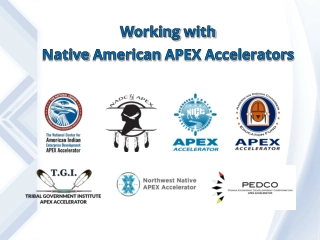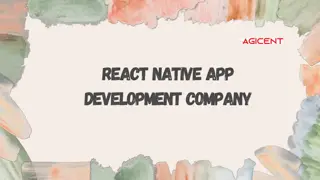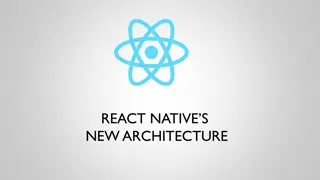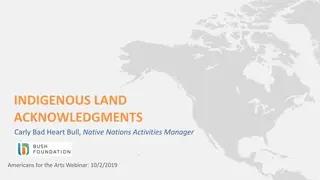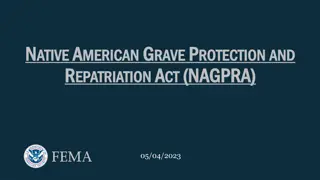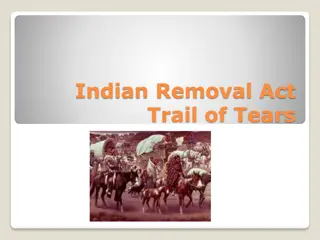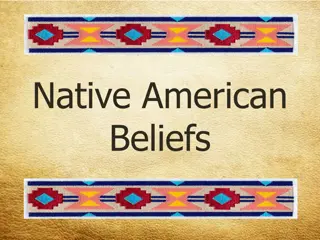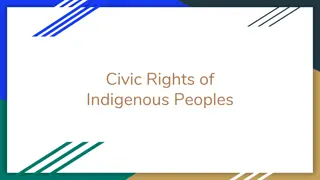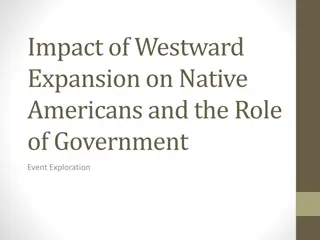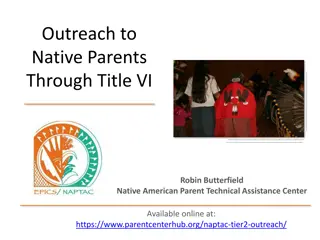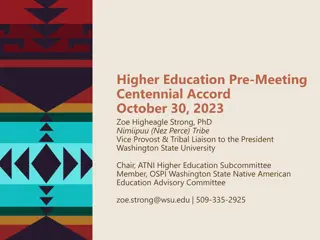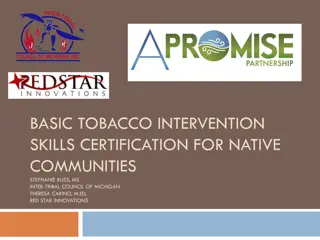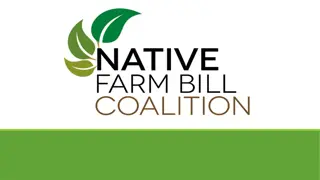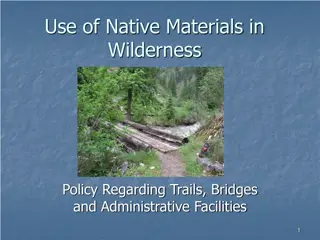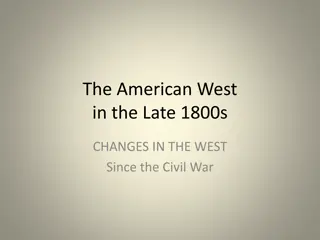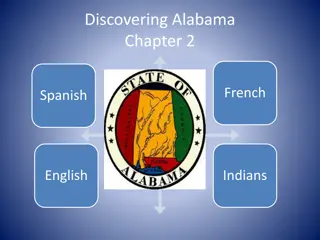ReuNify: A Comprehensive Analysis of React Native Android Apps
ReuNify is a program analysis project targeting React Native Android applications. It integrates JavaScript and native-side code into Jimple, facilitating static analysis. The tool addresses the challenges posed by the complex mechanisms of React Native and the transition to Hermes bytecode. With a
3 views • 24 slides
Native American APEX Accelerators Program Overview
The Native American APEX Accelerators Program, formerly known as PTACs, is a nationwide network of procurement professionals dedicated to assisting local businesses, including federally recognized Indian tribes and Alaska Native entities. Services are provided at no cost and aim to strengthen the de
1 views • 69 slides
Understanding Invasive Species in Northwest Michigan
Explore the impact of invasive species in Northwest Michigan through images and data on habitat support for butterfly and moth species, the transition of non-native plants to becoming native, and the definition of what makes a species invasive. Learn about the threats posed by non-native species and
4 views • 15 slides
Why Hire Agicent for React Native App Development
React-native development offers several critical benefits which make it as a tech stack of choice for everyone, but especially App startups.\n\nVisit:-\u00a0\/\/ \/react-native-app-development-company
1 views • 6 slides
Exploring Native vs Hybrid App Development for Mobile Apps
Delve into the differences between native and hybrid app development options for mobile apps. Native app development involves utilizing specific programming languages tailored to the device and platform, leading to fast performance, advanced UI interactions, and support for multi-touch capabilities.
1 views • 53 slides
Understanding React Native's New Architecture
React Native has introduced a new architecture that eliminates the traditional Bridge and leverages JavaScript Interface (JSI) for better communication between JavaScript and C++. This new architecture improves performance, enables synchronous execution, and enhances concurrency in React Native apps
1 views • 18 slides
Understanding Indigenous Land Acknowledgments
Indigenous land acknowledgments are a way to show respect and honor the land and its original inhabitants. They matter because they recognize the truth, promote relationship building, and inspire further action. Tips include researching Native history, building relationships with Native communities,
0 views • 16 slides
Top Strategies for Effective Native Advertising Campaigns
In an increasingly digital world, native advertising has emerged as a powerful tool for brands looking to engage with their audience in a more authentic and non-intrusive manner. Native advertising seamlessly blends promotional content with the surro
0 views • 4 slides
Cultural Awareness for Drug Courts Working with Native American Participants
Understanding the cultural nuances of Native American communities is crucial for Drug Courts collaborating with Tribal Healing to Wellness Courts. This involves acknowledging tribal sovereignty, regional and cultural differences, customs, spirituality, and communication styles unique to American Ind
0 views • 22 slides
Native American Repatriation and NAGPRA Overview
The Native American Graves Protection and Repatriation Act (NAGPRA) enacted since November 1990 establishes ownership of cultural items excavated on Federal or Tribal land. It requires returning such items to Native American descendants and affiliated tribes. The Act also criminalizes trafficking in
1 views • 8 slides
Hybrid Apps vs. Native Apps_ Making the Right Choice for Your Mobile Strategy
Discover the key differences between hybrid and native apps in our latest blog post, \"Hybrid Apps vs. Native Apps: Making the Right Choice for Your Mobile Strategy.\" Learn how each approach impacts performance, user experience, and development cost
0 views • 3 slides
The Indian Removal Act and the Trail of Tears
President Jackson supported the policy of Indian removal, leading to the Indian Removal Act in 1830, which authorized the relocation of Native Americans to the West. This resulted in the Trail of Tears, a tragic event where many Native Americans, such as the Choctaw, Creek, and Cherokee, were forced
0 views • 18 slides
Office of Native American Programs at the U.S. Department of Housing and Urban Development
Office of Native American Programs (ONAP) at the U.S. Department of Housing and Urban Development works with tribal governments and other entities to address housing and community development needs in Indian Country. ONAP's mission is to ensure safe, decent, and affordable housing for Native America
1 views • 14 slides
Understanding Native VLAN 1 in Mesh Ethernet Bridging
Mesh Ethernet bridging utilizes native VLAN 1 for the initial configuration, ensuring the RAP connects to the native VLAN ID 1 on a switch. This setup affects the communication between the RAP and the Map devices, as well as their connection to the controller. Misconfigurations related to VLAN taggi
0 views • 9 slides
Enhancing First Nations Governance through the First Nations Elections Act
The First Nations Elections Act (FNEA), developed between 2008 and 2011, addresses weaknesses in the Indian Act election system by offering an optional framework for First Nations governance. Key components include four-year terms, common election days, court appeals, defined offenses, and opting ou
0 views • 14 slides
Top Strategies for Effective Native Advertising Campaigns
In the ever-evolving digital landscape, advertising has taken on many forms. One such innovative method is native advertising, which integrates seamlessly into the platforms where it is placed. Unlike traditional ads, native ads match the look and fe
0 views • 11 slides
Exploring Native American Beliefs and Spiritual Practices
Delve into the rich tapestry of Native American beliefs, traditions, and spiritual practices, including their diverse worldviews, sacred connections to nature, and unique cultural expressions. Discover the origins of terms like "Indian" and the vast linguistic diversity among different Nations. Cont
3 views • 13 slides
Native American Voting Rights and Indigenous Governance in the United States
Native American voting rights in the United States have a complex history, with Native peoples gaining the right to vote gradually over time. Despite legal allowances, barriers such as nontraditional addresses, voter registration obstacles, and ID laws still hinder their voting participation. The Na
2 views • 11 slides
Office of Native American Programs Overview
The Office of Native American Programs (ONAP) focuses on increasing the housing supply and creating economic opportunities for Native American families. ONAP provides grants for various programs and ensures fiscal integrity. The agency plays a crucial role in assisting tribes with housing provision,
0 views • 15 slides
Impact of Westward Expansion on Native Americans: Government's Role & Effect
Explore the impact of western expansion on Native Americans during 1860-90 and analyze the role of the federal government through primary source documents revealing events, perspectives, and policies affecting Native lives amidst the changing landscape of the West.
1 views • 8 slides
Controversial Use of Native American Imagery in Sports Teams
Sports teams like the Washington Redskins, Atlanta Braves, Kansas City Chiefs, Cleveland Indians, and Chicago Blackhawks have faced criticism for their use of Native American imagery and mascots. This has sparked debates on cultural appropriation, racism, and the impact on Native American communitie
2 views • 8 slides
Exploring Native American Literature: Creation Stories and Themes
Delve into the rich world of Native American literature, focusing on creation myths, oral traditions, and cultural themes. Discover how these stories explain the origins of the world, human nature, and societal values, as passed down through generations. Explore key texts like "The World on the Turt
0 views • 32 slides
Effective Outreach Strategies for Native Parents under Title VI
Key questions and insights on outreach to Native parents through Title VI and Indian Education Act implications, including legislative changes and services provided. Discover effective ways to engage and support Native parents in education settings.
2 views • 20 slides
Understanding the Housing Improvement Program (HIP)
The Housing Improvement Program (HIP) is a grant program aimed at providing home repair, renovation, and replacement assistance to Native American and Alaska Native individuals facing housing challenges. HIP targets the neediest individuals to eliminate substandard housing and homelessness in Indian
0 views • 8 slides
Understanding the Native American Graves Protection and Repatriation Act (NAGPRA)
The Native American Graves Protection and Repatriation Act (NAGPRA) is a human rights/civil rights legislation aimed at protecting Native American cultural items and human remains. It requires federal agencies and museums receiving federal funds to inventory and repatriate certain items. The law has
0 views • 5 slides
Transforming Native Higher Education Data Reporting: Challenges and Solutions
Native identification and data problems in higher education impact accurate reporting and hinder access to resources for AI/AN students. The current reporting practices undercount and misidentify students, overlooking tribal affiliation. Tribal liaisons in higher education aim to address these issue
1 views • 6 slides
Native Communities Tobacco Intervention Skills Certification Program
Certification program focusing on tobacco intervention skills for Native communities, covering unhealthy behaviors, chronic diseases prevalent among Native populations, and strategies for behavior modifications. The program aims to address the high rates of tobacco use and its associated health risk
0 views • 85 slides
Native Farm Bill Coalition: Supporting Tribal Provisions and Consultation
Over 170 tribes and 77 Native Nations are represented in the Native Farm Bill Coalition, advocating for 63 tribal-specific provisions in the Farm Bill. The coalition welcomes more tribal leadership and organizations to join, offering tailored support, updates, and resources. Additionally, an upcomin
0 views • 9 slides
Understanding JFR in GraalVM Native Image
Explore the differences between JFR in GraalVM Native Image and OpenJDK, the current state of JFR support, and the building and running process with JFR. Learn about the benefits and limitations of using JFR in GraalVM Native Image for monitoring and profiling Java applications.
0 views • 24 slides
Forest Service Policy on Native Materials in Wilderness
This information outlines the use of native materials in wilderness areas, focusing on trails, bridges, and administrative facilities. It covers examples of structures using native materials, common questions surrounding material choices, guidelines for trail and wilderness managers, and Forest Serv
0 views • 31 slides
Reforming Income Assistance for First Nations: Building Towards Self-Determination
Income Assistance Reform for First Nations aims to address the longstanding gaps in the current program, focusing on enhancing self-determination and support for thriving communities. The initiative involves a co-development process led by First Nations to make the program more responsive to their u
0 views • 9 slides
Exploring Native Plants in Virginia's Capital Region
Discover the Hanover Master Gardener Association's initiative to promote native plant gardening in Virginia's Capital Region. Learn about the availability of the Native Plants Guide, both in physical locations and online, and how the community can access this valuable resource for free. Find out whe
0 views • 10 slides
Native Americans in the Late 19th Century: APUSH Review
Explore the systematic relocation, conflicts, and cultural assimilation of Native Americans during the late 19th century in America. From the Indian Removal Act to the Dawes Act, witness the impact of government policies on Native tribes, culminating in tragic events like the Sioux Wars and Wounded
0 views • 8 slides
Impact of Westward Expansion on Native Americans in the Late 1800s
The late 1800s saw significant changes in the American West due to westward expansion after the Civil War. This expansion led to conflicts with Native Americans as more whites moved west in search of gold, farmland, and opportunities. Native Americans fiercely resisted being forced onto reservations
0 views • 20 slides
Disparities in Salary Between Native and Non-Native Speaking Teachers in China
The images depict the significant salary gaps between native and non-native speaking teachers in China, showcasing disparities in hourly wages, monthly pay, and overall salary hierarchy. The comparison highlights various factors contributing to these differences, including vacation time, workload, a
0 views • 11 slides
European Exploration and Settlement of North America
European exploration of North America was primarily driven by the desire for wealth, power, and territorial expansion. The Spanish, French, and British each had unique interests in the southeastern region, with the Spanish seeking gold, conversion of Native Americans to Christianity, and personal gl
0 views • 21 slides
Understanding Nations, Nationalism, and Their Emergence: A Comprehensive Overview
Explore the concept of nationhood, the evolution of nationalism, and the intricate relationship between cultural and political identities. Delve into the emergence of nations, the definition of a nation, and the complexities of cultural nations. Uncover historical examples, such as the Polish-Lithua
0 views • 15 slides
Exploring Early Alabama: Europeans, Trade, and Native American Relations
In Chapter 2 of Discovering Alabama, the impact of French, Spanish, and English settlers on the Native American populations is explored. Key vocabulary such as immunity, bartered, cartographer, and more are highlighted. The lesson also delves into reasons for conflicts between Europeans and Native A
0 views • 69 slides
Post-World War II Policies: United Nations, Marshall Plan, and MacArthur's Plan
Following the aftermath of World War II, allied nations implemented various policies such as the formation of the United Nations, the Marshall Plan for Europe, and MacArthur's plan for Japan. Post-war Europe faced severe devastation, leading to the need for international peacekeeping efforts and eco
0 views • 38 slides
Native American Resistance in the Battle of Little Bighorn
In the aftermath of the Civil War, Native American tribes clashed with the United States over land rights, leading to conflicts known as The Indian Wars. Despite some victories, Native Americans were ultimately overwhelmed by the superior weaponry of the US Army. The Battle of Little Bighorn in Mont
0 views • 9 slides

